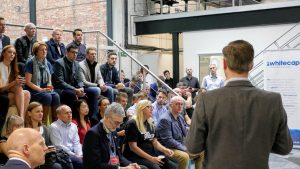FinTech North Newcastle Forum – Event Write Up
Jake Fox / 5th October 2018
At the inaugural FinTech North event in Newcastle on Friday 5th October the North East tech and FS community gathered together at Generator Studios to discuss FinTech trends and innovation.
Julian Wells, Director FinTech North:
Julian Wells kicked off the event with an update on FinTech North’s expansion into new events and new cities. FinTech North has now run 22 events since April 2016 with over 1800 registrations from more than 500 companies.
Julian also provided a brief overview of Whitecap Consulting, which recently opened a new office in Newcastle. Whitecap is a regional strategy and commercial consultancy working across a range of sectors, with an in-depth experience in the FS and tech sectors. Whitecap is a also the co-founder and organiser of FinTech North alongside White Label Crowdfunding.

On the FinTech sector, Julian discussed how the FinTech economy is growing across the northern powerhouse. This includes the regional remit of the HM Treasury FinTech envoys, the FCA sandboxes and a number of initiatives including the international FinTech missions to the north over the coming months.
What we don’t yet have is a really established and vibrant economy outside of London. But it is evolving and growing. One thing that’s quite tricky at the moment is getting the north to be a collaborative, joined up effort. FinTech North really wants to support and get involved in the great tech scene in the North East, as part of our mission to develop the FinTech community across the north of England. – Julian Wells, Director, FinTech North.
Aidan Dunphy, hedgehog lab
Next up we had the first of our four speakers, Aidan Dunphy of hedgehog lab. hedgehog lab is a digital consultancy that builds software products for businesses.
Provocatively titled “What the FinTech”, Aidan’s presentation provided an engaging talk on the FinTech sector, quickly stating that “FinTech is about transformative value propositions”.

He stressed the importance of providing actual value, and staying away from hollow buzzwords:
Innovation is the implementation of something new. It’s about being practical, actually solving problems. The most innovative FinTechs are solving problems in very intuitive ways.
Aidan then provided some cases studies of FinTech innovations:
Better mortgages provides an all-digital process for obtaining a mortgage, managing the whole process in 24 hours (when usually the process takes weeks).
It’s important to note that there isn’t any magic, transformative tech here, they’ve just executed the process in a much better way – Aidan Dunphy.
Earnin is a payment/lending platform linked to your work place. It cuts out the 4 week wait till pay day by tracking the time you spend at your job and paying you instantly for the hours you’ve worked.
Tala is a micro-finance company, colloquially labelled the biggest FinTech product in Kenya. Tala uses precise behavioural data to provide credit scoring and loans.
Forget about the tech. What these guys all do is disrupt customer service models. They are intuitive. What they don’t do is require you to navigate a complicated process.
Steven Marks, Newcastle Strategic Solutions
Next up we had Steven Marks providing a financial services’ perspective on how the banking and building society sector has had to evolve in response to tech and consumer demand.
He stated that Newcastle Building Society’s mission is: Connecting communities in the North East with a better financial future.
There is a lot going on in banking and saving markets. There have been a lot of new entrants into this market and the advent of open banking means banks have had to respond.
If banks are big slow ships, slow to turn, then they need to develop the capability to launch smaller, fast speedboats. Steven Marks on being agile.
Newcastle Strategic Solutions aims to raise and drive technology development in financial services firms.
We work to figure out the future direction of an FS business, focusing on customer journey, payments and cyber security.
(On analytics) With a large customer base and lots of accounts, there is really rich data we can start to use and manipulate to provide something more personal and more valuable. – Steven Marks.
Steven then discussed the future of customer focused financial services by proving some stats of some recent research that examined millennials and their expectations around banking.
The survey found that just 1% of respondents would expect to interact with their bank through social media at the moment. But 27% expect to completely deal with their bank account through social media in the future.
Steven concluded by emphasising their passion for collaboration and their North East based customer base. And they want to play an important part in driving tech forward to deliver new value for communities.
Richard Blakesley, Capital Pilot
Richard Blakesley was next up, he began his talk by explaining the challenges he is experiencing with a current fundraising round.
The fundraising process is massive waste of time, it’s inefficient and it kills startups. Investors constantly have to make decisions about stuff they don’t understand. And more often than not it’s not the right decision. So, we’re looking to fix that. Richard Blakesley

Richard explained that Capital Pilot has developed an online process and database to help startups match up with relevant investors. Helping to streamline and improve the fundraising process.
Building on their proposition, Capital Pilot has also developed Autopilot – an investment fund that scores startups and automatically moves funds to startups that fill the criteria that investors set. This aims to increase the liquidity of equity angel investment.
We are using tech to solve a clunky business model that is across an entire industry. Richard Blakesley.
Richard told us how investors often state the most important thing they look at in startups is the team, but there is no objective way to measure this – and it’s a hugely important factor in whether to invest. Capital Pilot are looking to explore this area.
We don’t know yet what makes a great entrepreneur. But we’ve started to capture data on this sort of stuff. Really rich data can help us analyse the ultimate factor on a successful investment, the actual entrepreneur. Richard Blakesley.
Panel discussion
The event then moved into an interactive panel discussion involving the speakers plus Paul Lancaster of Plan Digital, Gavin Sewell of honcho, Gary Lumby of Focus on Success, and Nick Edgar from CYBG.
Some of the topics discussed involved the opportunities and strengths the North East holds in the FinTech sector (particularly around the leading software development community) as well as factors around value proposition:
You should build your business not on what you want to make, but on what people want to buy and use. – Gary Lumby
The panel also discussed location factors, with a general agreement that where you base your business should not be a fundamental factor and that there are plenty of cities in the north that provide enough room and opportunity for growth.
Being in London isn’t in itself the success factor in financial services. Location shouldn’t make a difference when you are fundamentally providing something valuable. – Aidan Dunphy
On funding,
I genuinely see London based investors starting to place people in the regions because the supply is there and they want that fluid deal flow. – Nick Edgar, CYBG.
On talent and skills,
There is undeniably a benefit of being in a cluster. London and Manchester are doing this well. However, the way that technology is working is that people can be anywhere and I think that is a trend that Newcastle can jump on while also providing that quality of life factor. Aidan Dunphy.
Proper quality of life is a much more important factor now as well as work life balance. I think tech has helped enable that. – Aidan Dunphy
On cities,
Newcastle shouldn’t aim to more like other cities. Hopefully we can focus on uniqueness, celebrating what’s great about this city compared to other cities. – Richard Blakesley
On entrepreneurial ecosystem,
The North East has a great ecosystem of businesses looking to foster innovation and entrepreneurship. Trade bodies such as Tech Nation or the government can definitely play a more prominent role in building the tech scene. In particular if government can attract big businesses to be based here, then maybe startups will pop up to serve them. – Gavin Sewell
On diversity,
It’s great to see a growing population of female entrepreneurs and we are definitely seeing progress in this area. The number of females on executive teams and boards is increasing as well, but there absolutely is more we can do. – Gary Lumby

Our Women in FinTech North event showed that there’s a real enthusiasm for tackling this issue. And we’ll be putting on more events that focus on this. – Julian Wells
On established FS firms collaborating with early stage startups,
We can’t afford to take big risks, so we have to do due diligence. But more importantly is what the startups are actually bringing to the table in terms of adding to the value offering we want to provide. It also depends on the nature of the service – if it’s a supporting function that provides a great value add but doesn’t put our core services at risk then we absolutely welcome collaboration with those companies. – Steven Marks
As an alternative to traditional supplier relationships where we purchase a service, we can consider going on a journey with them, be more invested in them and build a strong relationship collaboratively. – Steven Marks.
I agree, that is definitely a trend we are seeing in the banking and tech sectors. – Julian Wells.

On growing a startup and value proposition,
Teams are really important. People that have the relevant experience that larger companies will see as credible. Also, I know IP is really important, but you still have to develop the skills of communicating the idea to potential users, investors and other stakeholders. – Paul Lancaster
Success is 5% idea and 95% the execution of it. So, don’t get hung up on protecting the idea. Show you can nail the execution by validating the concept with real people. – Aidan Dunphy
You are looking to provide the simplest solution to a problem. The ideal number of features on a product is one (which realistically isn’t possible), but you should strive to build the simplest solution to a problem. – Aidan Dunphy
We hate to hear “I’ve got an idea for an app”. Going product first rather than problem first is bad step. – Richard Blakesley
Julian concluded the event by thanking the speakers and attendees and welcomed anybody to get in touch if they are interested in being involved in future FinTech north events in the North East.

See our upcoming events
